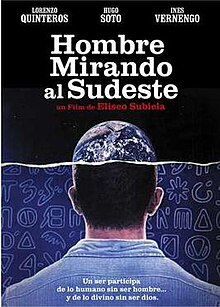Man Facing Southeast
| Man Facing Southeast | |
|---|---|

Theatrical release poster
|
|
| Directed by | Eliseo Subiela |
| Produced by | Luján Pflaum Hugo E. Lauría |
| Written by | Eliseo Subiela |
| Starring |
Lorenzo Quinteros Hugo Soto |
| Music by |
Pedro Aznar Andrés Boiarsky |
| Cinematography | Ricardo de Angelis |
| Edited by | Luis César d'Angiolillo |
|
Production
company |
|
|
Release date
|
|
|
Running time
|
105 minutes |
| Country | Argentina |
| Language | Spanish |
Man Facing Southeast (Spanish: Hombre mirando al sudeste) is a 1986 Argentine drama-science fiction film written and directed by Eliseo Subiela and starring Lorenzo Quinteros and Hugo Soto.
The film was selected as the Argentine entry for the Best Foreign Language Film at the 60th Academy Awards, but was not accepted as a nominee.
The themes and story of the 2001 American film K-PAX allegedly share a strong resemblance with Man Facing Southeast, and the former has been referenced or claimed as an uncredited remake of the latter.
The staff and patients go about their daily business at Buenos Aires' José Borda Psychiatric Hospital on a summer day in 1985. A staff psychiatrist, Dr. Julio Denis (Lorenzo Quinteros) is surprised to hear that his ward for non-violent delusional cases has one patient too many. Denis finds the patient in the chapel playing the organ like a virtuoso. Summoning him (Hugo Soto) to his office, Denis finds the man's speech is measured and articulate as he explains his presence on Earth as a result of his image being projected from light years away. He introduces himself as "Rantés" (an exotic-sounding name in Argentina). Dr. Denis suggests that Rantés might be a fugitive hoping to hide from the law in the hospital. He lets the patient stay however, after seeing how his caring touch helps the other patients. The doctor is amused by his extraterrestrial claims and he suspects that the man is a genius using his talents as a charade.
Julio Denis is a highly professional, lonely man, whose recent divorce left him jaded towards his life and work. Since his wife remarried, he settles for weekly outings with his two children and grainy home movies of happier times, which he views every night. Rantés, noticing the wounded Dr. Denis, is as interested in his troubles as the doctor is in Rantés, "the first patient in a long time" that has interested him at all. Believing his claim to be a "projected hologram", an allusion to Adolfo Bioy Casares' novel, Morel's Invention, Dr. Denis concludes that this impressive genius is very well-read. The doctor soon uses his prerogatives to include Rantés in several outings, including a visit to a touring Moscow State Circus performance.
...
Wikipedia
